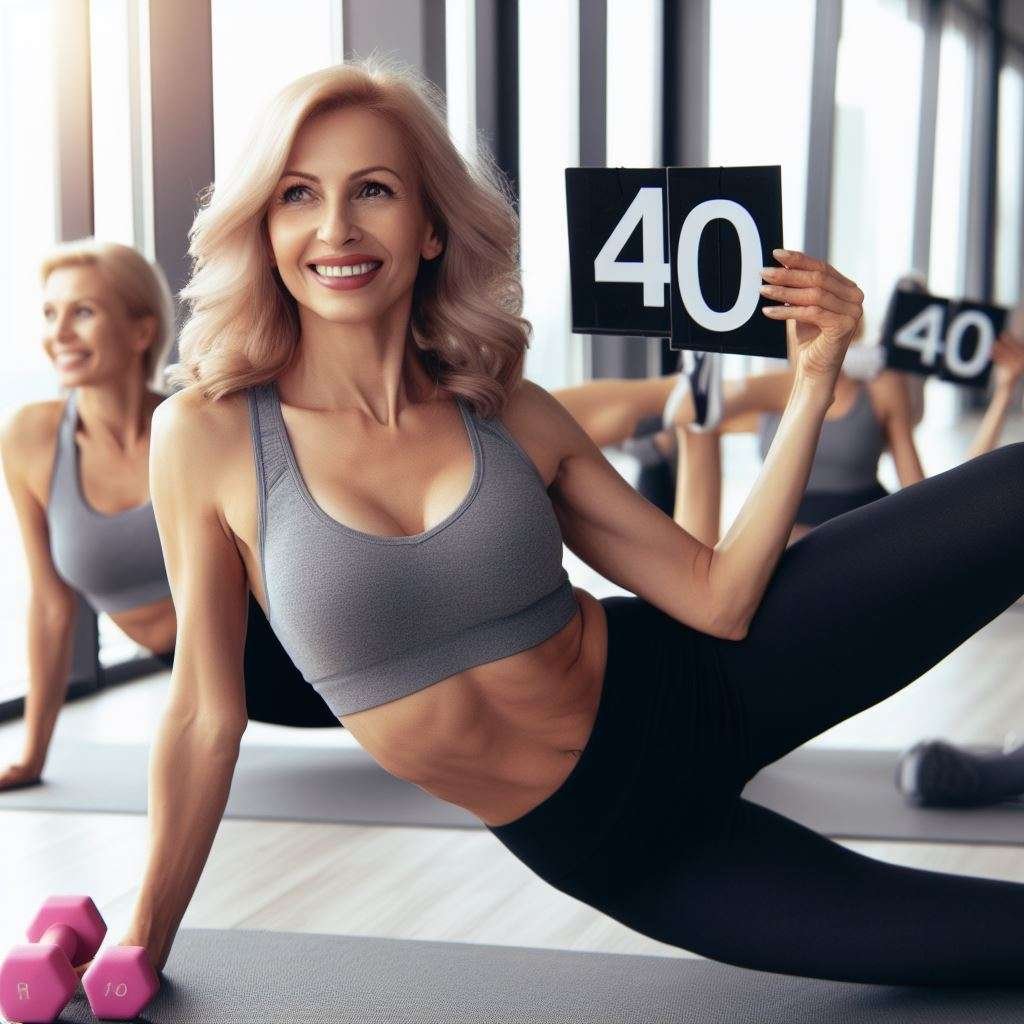Key Takeaways:
- You’re never too old to prioritize your health and fitness.
- Following a balanced diet, getting enough sleep, and finding an exercise routine that works for you are crucial to staying fit over forty.
- Overcoming common challenges such as time constraints and physical limitations requires practical strategies and determination.
- Mental and emotional well-being plays an essential role in your fitness journey.
- Embracing a fit lifestyle is a long-term commitment that requires motivation, accountability, and support.

Welcome to an exciting world where age is just a number, and fitness is within reach, regardless of your age.
Whether you’re already over forty, or it’s looming on the horizon, you’re not alone in feeling overwhelmed by the thought of maintaining an active lifestyle.
However, with the right mindset and approach, it’s possible to stay fit, healthy, and strong well into your forties and beyond.
Here, we’ll provide you with tips and advice to help you prioritize your fitness and well-being, overcome common challenges, and achieve long-term success. Our focus is on women over forty, who may face unique obstacles and concerns when it comes to fitness.
Why Fitness Matters at Forty and Beyond
As you age, fitness becomes essential for maintaining a healthy and high-quality life. Exercise not only helps prevent chronic diseases and slows the aging process, but it also improves your mental health and overall well-being.
For women over forty, fitness can be especially crucial as hormone changes and a slower metabolism can impact overall health and body composition. Engaging in regular physical activity can help counteract these effects and promote a healthy body weight, muscle mass, and bone density.
Regular exercise can also improve heart and lung function, reduce your risk of heart disease, stroke, and diabetes, and boost your immune system, meaning fewer sick days and overall better health.
On top of that, exercise has been shown to have a significant impact on mental health, reducing symptoms of anxiety, depression, and stress. As you navigate the challenges of life over forty, this can be a crucial aspect of overall well-being.
Why Fitness Matters at Forty and Beyond
The benefits of fitness are numerous, and they only become more important as you age. Exercise can help:
- Prevent chronic diseases
- Slow the aging process
- Promote a healthy body weight, muscle mass, and bone density
- Improve heart and lung function
- Reduce the risk of heart disease, stroke, and diabetes
- Boost the immune system
- Reduce symptoms of anxiety, depression, and stress
By prioritizing fitness in your life over forty, you can improve your overall health and well-being and ensure that you’re able to enjoy life to the fullest for many more years to come.
Women Over 40: Personalized Activity Recommender
Check out our Personalized Activity Recommender designed specifically for women over 40.
As you navigate through life’s changes, exercise can play a pivotal role in maintaining and improving your health.
By providing insights into your current activity level and any health conditions, our tool can suggest age-appropriate exercises tailored for you.
Disclaimer: This tool provides general recommendations based on common fitness guidelines. Every individual’s health and fitness needs are unique. Before starting any new exercise regimen, it’s essential to consult with a fitness or medical professional to ensure that activities are safe and appropriate for your specific situation.
Activity Recommender for Women Over 40
Making the Most of Your Recommendations
Thank you for using our Personalized Activity Recommender! Remember, the suggestions provided are a starting point to inspire and guide you. Listen to your body and adjust any activity as needed.
Consistency is key. Whether it’s a brisk walk in the park, a Pilates session, or a dance class, the best exercise is one you enjoy and can maintain over time. It’s never too late to start, modify, or intensify your fitness journey.
Overcoming Common Challenges
Staying fit and active over forty can be challenging for women. Hormone changes, physical limitations, and time constraints can make it seem impossible to maintain a regular fitness routine. However, overcoming these challenges is possible with the right mindset and strategies.
One of the most significant obstacles to fitness over forty is the decline in hormone levels, particularly estrogen. This can lead to an increased risk of osteoporosis and weight gain, making exercise essential to maintaining bone density and a healthy weight. It’s essential to adapt your fitness routine to your body’s changing needs and limitations.
Time constraints are another common challenge women over forty face. Between work, family obligations, and other commitments, finding time to exercise can seem impossible.
However, prioritizing your health and scheduling exercise into your daily routine can make a significant difference. You can also try shorter, high-intensity workouts to make the most of your time.
Physical limitations, such as joint pain or injury, can also make staying active more challenging. It’s essential to consult with a healthcare professional to create a fitness routine that is safe and effective for your body. Modifying exercises or incorporating low-impact workouts like swimming or yoga can also help overcome physical limitations.
Overall, overcoming common challenges to fitness over forty requires flexibility, adaptability, and a willingness to try new things. With the right mindset and strategies, you can achieve and maintain a healthy, active lifestyle well into your forties and beyond.

Finding the Right Exercise Routine
When it comes to fitness over forty, finding the right exercise routine is essential for achieving your goals and maintaining overall health. But with so many different types of workouts and exercises to choose from, it can be overwhelming to know where to start.
The first step is to consider your personal preferences and fitness goals:
Do you enjoy high-intensity workouts, or do you prefer something low-impact?
Are you looking to build strength, increase flexibility, or improve cardiovascular health?
Answering these questions will help you narrow down your options and find a routine that works for you.
One important factor to keep in mind is that as we age, our bodies may not be able to handle the same level of intensity or impact as they once did. This means that it’s crucial to listen to your body and avoid overexertion or pushing yourself too hard.
Here are some types of exercises that are particularly beneficial for women over forty:
Cardiovascular Exercises
Cardio exercises are great for improving heart health, boosting metabolism, and burning calories. Walking, running, swimming, cycling, and dancing are all great options for cardiovascular workouts.
Aim for at least 150 minutes of moderate-intensity cardio per week or 75 minutes of vigorous cardio.
Strength Training
Strength training is crucial for maintaining muscle mass, bone density, and overall strength as we age. Using weights or resistance bands can help build and tone muscles, and incorporating exercises that target multiple muscle groups can be particularly effective. Aim to strength-train at least twice a week, targeting each major muscle group.
Flexibility Workouts
Flexibility exercises such as yoga or Pilates can help improve range of motion, reduce stiffness and soreness, and promote better posture. They’re also low-impact, making them ideal for those with joint pain or mobility issues. Aim to incorporate stretching and flexibility exercises into your routine at least two to three times per week.
Remember, now that you’re over forty, your exercise routine should be tailored to your individual needs and goals. Working with a personal trainer or fitness professional may be helpful in developing a routine that is safe and effective for you.
Nourishing Your Body with the Right Fuel
Keeping your body properly fueled is crucial to maintaining fitness over forty. As your body changes with age, it requires different nutrients to function optimally. Here are some tips for nourishing your body with the right fuel:
- Emphasize nutrient-dense foods such as fruits, vegetables, lean proteins, and whole grains. These foods provide the vitamins, minerals, and antioxidants your body needs to stay healthy and ward off disease.
- Watch your portion sizes. As our metabolism slows down with age, we require fewer calories to maintain our weight. Use smaller plates and bowls to help control your portions.
- Stay hydrated by drinking plenty of water throughout the day. Avoid sugary drinks, which can dehydrate your body and negatively impact your health.
- Experiment with different diets and find what works best for you. Some women over forty find success with low-carb, high-fat diets like the ketogenic diet, while others thrive on plant-based or Mediterranean-style diets.
- Consider taking supplements to help fill in any nutritional gaps in your diet. Speak with your doctor or a qualified nutritionist before starting any new supplement regimen.
Remember, the food you eat has a direct impact on your energy levels, mood, and overall health. By nourishing your body with the right fuel, you’ll be better equipped to tackle your fitness goals and live your best life over forty.

Prioritizing Sleep and Recovery
Getting enough sleep and allowing adequate recovery time is just as important as the workouts themselves. Sleep plays a crucial role in overall health and wellness, and it’s no different when it comes to fitness over forty. Recovery is also essential in preventing injury and ensuring optimal performance.
Aim for at least seven hours of sleep each night, and try to establish a consistent sleep routine. This will help regulate your body’s circadian rhythm and ensure more restful sleep.
When it comes to recovery, listen to your body and allow ample time for rest between workouts. Active recovery options, such as yoga or stretching, can also help improve flexibility and mobility while promoting recovery.
Don’t forget to hydrate and fuel your body with nutrient-rich foods after your workouts, as this will aid in the recovery process.
Make sleep and recovery a priority in your fitness journey over forty, and you’ll be sure to see the results you’re aiming for.
Maintaining Mental and Emotional Wellbeing
Staying fit over forty is not just about physical health but also about mental and emotional well-being. Taking care of your mental and emotional health is just as important as staying active and eating well. Here are some strategies to help you maintain mental and emotional well-being as you age:
Practice Stress Management Techniques
Stress can have a significant impact on mental and physical well-being, so it’s essential to find ways to manage it effectively. Consider incorporating stress-relieving activities, such as meditation, yoga, or tai chi, into your routine.
Cultivate a Positive Mindset
Positive thinking can have a significant impact on mental and emotional well-being. Re-frame negative thoughts into positive ones and focus on your strengths and accomplishments. A positive attitude can help you stay motivated and reduce stress levels.
Find Balance
Balance is essential for overall well-being. Make time for activities that bring you joy outside of your fitness routine and work life. Schedule regular self-care activities, such as a spa day or a weekend getaway, to help you recharge and reset.
Connect with Supportive Networks
Connecting with supportive networks can provide a sense of belonging and social support, which can improve mental and emotional well-being. Consider joining a fitness group, taking a class, or connecting with like-minded individuals in your community.
Seek Professional Help When Needed
If you’re struggling with mental health concerns such as depression or anxiety, it’s essential to seek professional help. Talk to your doctor or a mental health professional, who can provide guidance and support to help you manage your symptoms.
The Power of Strength Training for Fitness Over Forty
Strength training is an essential aspect of fitness, especially for women over forty. As you age, your muscles naturally lose mass and strength, leading to a decline in physical abilities. However, incorporating strength training into your fitness routine can significantly slow this process and even reverse it.
Strength training not only helps build muscle mass and increase strength but also improves bone density, balance, and coordination. It can also reduce the risk of chronic diseases, such as osteoporosis, arthritis, and diabetes.
If you’re new to strength training, it’s essential to start slowly and gradually increase the weight and intensity over time.
Consider working with a certified personal trainer or fitness professional who can guide you through the proper techniques and form. Focus on compound exercises that work multiple muscle groups, such as squats, lunges, push-ups, and pull-ups.
Strength training doesn’t always require heavy weights or specialized equipment. Bodyweight exercises, resistance bands, and even household items like cans or water bottles can serve as effective tools for building strength and muscle. Just be sure to challenge yourself and gradually increase the resistance as you progress.
Incorporating strength training into your fitness routine can be a game-changer for your overall health and quality of life. Remember that fitness over forty is not only achievable but also essential for optimal physical and mental well-being.
Flexibility and Mobility: Stay Supple
As you age, maintaining flexibility and mobility becomes increasingly important. Flexible muscles and mobile joints promote better balance, reduce the risk of injury, and improve overall physical performance. Incorporating exercises that stretch and mobilize your body can help keep you supple and active.
Stretching is one of the simplest ways to improve flexibility. Incorporate stretching exercises into your warm-up before vigorous exercise and post-workout cool-down routine to help minimize muscle soreness. Yoga and Pilates are other effective ways to improve flexibility and mobility, especially for women over forty.
Additionally, mobility exercises focus on promoting joint movement and function. Mobility workouts can include exercises that are designed to target specific joints or movement patterns, such as hip rotations, shoulder stretches, and spinal mobilization. By improving the mobility of your joints, you’ll find that everyday activities, such as bending, lifting, and twisting, become easier to do.
Remember, it’s crucial to warm up before stretching or engaging in mobility exercises to prevent injury. Start with gentle movements, and gradually increase the intensity as your body prepares for physical activity. A regular exercise routine that focuses on flexibility and mobility will help ensure that you stay supple and active over forty.

Functional Fitness for Everyday Life
As you age, it becomes increasingly important to focus on functional fitness exercises. These types of exercises mimic the movements you perform in daily life, such as carrying groceries, bending down to pick up something from the floor, and getting up from a chair. By incorporating functional fitness into your workout routine, you can enhance your overall physical capabilities and improve your quality of life.
Functional fitness exercises typically involve multiple muscle groups and require coordination and balance. Some examples include bodyweight exercises such as squats, lunges, and push-ups, as well as exercises with resistance bands or dumbbells.
One effective functional fitness exercise is the farmer’s walk, where you carry heavy weights in each hand and walk for a set distance or time. This exercise engages your grip strength, core muscles, and lower body.
Functional fitness can benefit women over forty by improving joint mobility, strengthening muscles, and preventing injuries. It can also make daily activities easier and more manageable, promoting independence and confidence.
So, when planning your fitness routine, don’t forget to include functional fitness exercises that are tailored to your specific needs and goals.
The Role of Mindful Exercise
When it comes to fitness over forty, exercise goes beyond simply sweating it out at the gym. Mindful exercise involves being fully present during your workout, connecting your mind and body.
By focusing on your movements and breath, you can enhance the mind-body connection and improve your overall fitness experience.
Mindful exercise can also reduce stress and improve mental clarity, helping you feel more energized and focused throughout the day. By incorporating mindfulness into your fitness routine, you can also reduce your risk of injury and improve your range of motion.
Some great ways to incorporate mindfulness into your workouts include practicing yoga, taking a relaxing walk in nature, or simply taking a few deep breaths before beginning your exercise routine.
Remember, being mindful is not about perfection or reaching a certain outcome. It’s about being present in the moment and enjoying the journey towards your health and fitness goals.
So, the next time you lace up your sneakers or roll out your yoga mat, take a moment to breathe and enjoy the present moment. Your mind and body will thank you.

Supportive Communities and Accountability
Embarking on a fitness journey can be daunting, especially when you’re over forty. But, it’s essential to remember that you don’t have to do it alone. A supportive community can make a world of difference in achieving your fitness goals.
Joining a fitness class or group can provide you with the motivation and support you need to stay on track. It’s also a great opportunity to meet like-minded people who share similar goals and challenges. Consider joining a running group, yoga class, or even an online fitness community.
Another effective way to stay accountable is by finding a workout buddy. Working out with a friend can make the experience more enjoyable, and you can encourage each other to push harder. Plus, you’ll be less likely to skip a workout if someone is counting on you.
Alternatively, you can hire a personal trainer who will keep you accountable and provide you with expert guidance. A personal trainer can create a customized workout plan tailored to your individual needs, preventing you from plateauing or falling short of your goals.
Remember, support and accountability are crucial for long-term success. Don’t hesitate to seek out a community or partner to help you stay on track.
Embracing a Fit Lifestyle Beyond Forty
Congratulations! By reaching this section, you’ve already taken a significant step towards embracing a fit lifestyle beyond forty. Remember, fitness is not a destination; instead, it’s a journey that requires consistent effort and dedication.
To maintain a fit lifestyle, you need to prioritize your physical and mental health. It may require a shift in your daily routines, but it’s worth it. Incorporating physical activity, healthy eating habits, quality sleep, and stress management techniques into your daily routine will improve your overall quality of life.
However, it’s also essential to enjoy the process. Find physical activities that you enjoy, experiment with new recipes, try out different mindfulness practices, and connect with like-minded women who share your fitness goals.
It’s natural to have setbacks and obstacles along the way, but don’t let them hinder your progress. Instead, use them as learning opportunities and opportunities to push yourself further.
Remember, being fit over forty is not only about physical appearance but also about feeling confident, powerful, and healthy. Enjoy the journey!
Adapting to Individual Health Considerations
Staying fit over forty requires taking into account individual health considerations. As you aim to maintain or improve your fitness level, it is essential to be aware of any pre-existing conditions and potential risks. Consulting with a healthcare professional before starting a new exercise routine is highly recommended.
Some health considerations that may come into play as you exercise over forty include arthritis, osteoporosis, and heart disease.
For instance, women over forty may experience a decrease in bone density, making them more vulnerable to fractures.
As such, it is crucial to prioritize low-impact activities and incorporate strength training and weight-bearing exercises to build bone density.
Arthritis can cause discomfort and pain, especially in the joints, which can make exercising difficult. However, low-impact activities such as swimming, cycling, and yoga can help relieve pain and stiffness, making it easier to stay active.
Heart disease is a leading cause of death for women over forty, and regular exercise can help reduce the risk of developing this condition. However, it is crucial to take precautions, such as starting small and gradually increasing intensity and monitoring heart rate during exercise.
Designing an exercise routine that suits your individual needs and limitations is key to success. Consider seeking professional advice and support from a certified trainer or healthcare provider to create a personalized fitness plan that takes into account any health considerations you may have.
Staying Motivated for Long-Term Success
Congratulations on taking a step towards prioritizing your health and fitness over forty! Now, as you embark on this journey, it’s crucial to stay motivated for long-term success. Here are some tips to keep you going:
1. Set realistic goals: Start by setting achievable goals that align with your lifestyle, preferences, and capabilities. Don’t try to fit into one-size-fits-all fitness routines. Instead, customize a plan that works for you and your unique needs.
2. Track your progress: Keep track of your progress by tracking your workouts, nutrition, and other metrics. This will help you visualize your accomplishments and stay motivated to keep going.
3. Celebrate small wins: Celebrate every small win, whether it’s completing a workout or making healthier food choices. This will keep you engaged and motivated to continue on your fitness journey.
4. Find a workout buddy: Having a workout buddy can provide accountability, motivation, and support. Find someone who shares similar fitness goals and preferences and workout together regularly.
5. Mix it up: Avoid getting bored by mixing up your workouts and trying new activities. This will keep your mind and body engaged and motivated.
6. Reward yourself: Treat yourself to small rewards after achieving your fitness goals. This will provide an extra boost of motivation to keep going.
Remember, staying motivated is key to achieving long-term success in your fitness journey over forty. Use these tips, find what works for you, and keep pushing yourself toward a healthier, happier you!

Conclusion
Congratulations! You’ve made it to the end of this Fit Over Forty guide, and we hope you found it helpful. The biggest takeaway from this article is that age should never be a barrier to achieving and maintaining fitness.
You can lead a healthy and active lifestyle well into your forties and beyond with the right mindset, tools, and support.
To summarize, we covered a range of topics, including the importance of fitness after forty, common challenges and how to overcome them, finding the right exercise routine, nourishing your body with the right fuel, prioritizing sleep and recovery, maintaining mental and emotional well-being, the power of strength training, flexibility and mobility, functional fitness, and the role of mindful exercise.
We also discussed the significance of having a supportive community and accountability, adapting to individual health considerations, and staying motivated for long-term success.
Remember, incorporating fitness into your lifestyle is a long-term commitment, not just a short-term goal. Embrace the journey, listen to your body, and seek professional advice when necessary. You got this!
FAQ
Q: What is the importance of fitness for women over forty?
A: Fitness is important for women over forty as it helps improve overall health, boosts energy levels, maintains a healthy weight, and reduces the risk of chronic diseases.
Q: What are the common challenges women over forty face when trying to stay fit?
A: Women over forty may face challenges such as time constraints, hormone changes, and physical limitations. However, with practical advice and strategies, these challenges can be overcome.
Q: How can I find the right exercise routine as a woman over forty?
A: Finding the right exercise routine involves considering your individual needs and goals. Options include cardiovascular exercises, strength training, and flexibility workouts.
Q: What role does nutrition play in maintaining fitness over forty?
A: Nourishing your body with the right fuel is important for fitness over forty. This includes creating a balanced and nourishing diet, portion control, consuming nutrient-rich foods, and staying hydrated.
Q: How do sleep and recovery contribute to fitness over forty?
A: Quality sleep and adequate recovery are vital for a successful fitness journey. Tips and strategies for improving sleep quality and promoting effective recovery will be provided.
Q: What strategies can I use to maintain mental and emotional well-being?
A: Managing stress, cultivating a positive mindset, and finding balance are key strategies for maintaining mental and emotional well-being in the fitness journey over forty.
Q: What are the benefits of strength training for women over forty?
A: Strength training is crucial for women over forty as it helps maintain muscle mass, strengthens bones, improves metabolism, and enhances overall physical capabilities.
Q: How can I improve flexibility and mobility for fitness over forty?
A: Exercises and stretches that improve flexibility and mobility will be introduced, promoting joint health and preventing injuries for women over forty.
Q: What is the importance of functional fitness exercises for women over forty?
A: Functional fitness exercises mimic movements used in daily life, enhancing overall physical capabilities and promoting independence and longevity.
Q: What are the benefits of incorporating mindful exercise for women over forty?
A: Mindful exercise connects the mind and body, enhancing the benefits of physical activity while reducing stress and improving overall well-being for women over forty.
Q: How can supportive communities and accountability enhance the fitness journey over forty?
A: Having a supportive community and accountability mechanisms can provide motivation, encouragement, and guidance for women over forty on their fitness journey.
Q: How can I adapt my fitness routine to individual health considerations?
A: Considering individual health factors is crucial for adapting fitness routines. Seeking professional advice and modifying exercises accordingly is essential for women over forty.
Q: What are some strategies to stay motivated for long-term success in fitness over forty?
A: Practical strategies and tips will be provided to help women over forty stay motivated on their fitness journey and achieve long-term success.

Meet Marcella Raskin: Founder, Editor-in-Chief, and a Maven in Human Potential
Dive into the rich tapestry of Marcella Raskin’s life and you’ll discover more than just an editor-in-chief. At the core, Marcella is a passionate writer, deeply committed to unlocking the boundless human potential. Armed with expertise in Cognitive Behavioral Therapy, Life Purpose Coaching, and Group Life Coaching, she’s carved a niche in helping both women and men unearth their true selves through the art of writing. Every article she pens is a gateway, inviting readers to shift mindsets and embrace transformation, even when change seems impossible.
Beyond her literary pursuits, Marcella is a fitness enthusiast, underpinned by her background in Exercise Physiology. And when she’s not empowering others or delving into the science of movement, she’s reveling in the joys of motherhood, raising two incredible girls, and sharing life’s moments with her beloved spouse.
Trust Marcella’s words; they’re backed by expertise, passion, and a journey full of learning and growth.
Reviewed By: Joanna Perez and Brenda Tillman
Edited By: Lenny Terra
Fact Checked By: Matthew Mansour
Photos Taken or Curated By: Matthew Mansour